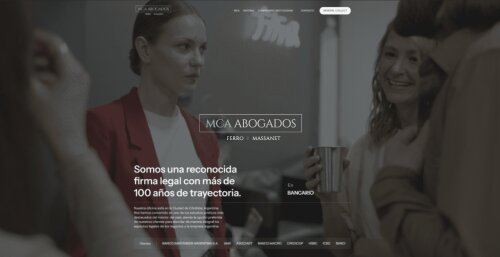Best Reinsurance Lawyers in Córdoba
Share your needs with us, get contacted by law firms.
Free. Takes 2 min.
List of the best lawyers in Córdoba, Argentina
About Reinsurance Law in Córdoba, Argentina
Reinsurance is the mechanism by which insurance companies transfer part of their risk portfolios to other insurers - reinsurers - in order to protect solvency, stabilize results and increase capacity to underwrite business. In Córdoba, Argentina, reinsurance transactions are subject to a mix of national insurance regulation, federal fiscal and foreign-exchange rules, and provincial tax and administrative requirements. The primary regulatory framework for insurance and reinsurance activity is set at the national level, while provincial authorities can affect tax treatment, registration of local entities and certain administrative obligations. Reinsurance contracts used by insurers in Córdoba will therefore reflect a combination of commercial practice and compliance with Argentine regulatory, tax and currency-control rules.
Why You May Need a Lawyer
Reinsurance involves complex commercial and regulatory issues. You should consider hiring a lawyer if you are an insurer, reinsurer, intermediary or a large insured facing any of the following situations:
- Entering into or negotiating treaty or facultative reinsurance agreements with domestic or foreign counterparties.
- Determining whether a foreign reinsurer may be treated as admitted or non-admitted for regulatory and accounting purposes, and the consequences for reserves and cessions.
- Resolving disputes over reinsurance recoveries, allocation of losses, late notification of claims, or alleged breach of contract.
- Assessing tax and value-added tax treatment of reinsurance premiums, commissions and recoveries, including provincial gross receipts implications.
- Complying with foreign-exchange controls and payment restrictions when premium or claim flows cross the Argentine border.
- Responding to regulatory inquiries, audits or sanctions from the national regulator or provincial authorities.
- Structuring retrocession programs, collateral arrangements, trust accounts or bank guarantees to secure reinsurance obligations.
Local Laws Overview
The legal environment relevant to reinsurance in Córdoba is shaped by several overlapping regimes:
- National insurance regulation - The national insurance regulator sets rules on licensing of insurers, solvency, technical reserves, admitted reinsurers and reporting requirements. These rules influence which reinsurers count as admitted for local accounting and solvency purposes and what documentation insurers must keep for cessions and recoveries.
- Foreign reinsurers and registration - Foreign reinsurers that wish to be treated as admitted typically must meet registration or recognition criteria established by the national regulator. When reinsurance is placed with non-admitted foreign entities, local insurers may need to hold additional reserves or obtain collateral.
- Contract law and commercial practice - Reinsurance contracts in Argentina are governed by general contractual principles, commercial customs and the specific terms agreed by parties. Common contract clauses address scope of coverage, limits, retentions, claims notification, arbitration or jurisdiction, insolvency and insolvency carve-outs.
- Taxation and provincial levies - Tax treatment of insurance and reinsurance transactions includes federal tax obligations and provincial taxes such as gross receipts or turnover tax applied by provinces like Córdoba. The allocation of premiums and commissions between cedant and reinsurer has tax consequences and should be planned with tax counsel.
- Foreign-exchange and capital controls - Payments to and from foreign reinsurers are subject to Argentina s foreign-exchange framework and central bank rules. These controls can affect timing and mechanics of premium remittances and recoveries, and may require documentation or approvals.
- Dispute resolution - Parties typically agree on governing law and dispute resolution mechanisms. Arbitration clauses are frequent in reinsurance contracts because they provide specialized decision makers and enforceability across jurisdictions, but choice of forum and enforceability should be examined in light of Argentine procedural and public policy limits.
Frequently Asked Questions
What is the difference between treaty reinsurance and facultative reinsurance?
Treaty reinsurance covers a defined book or portfolio of risks under an ongoing agreement between cedant and reinsurer. Facultative reinsurance is negotiated case by case for individual risks. Treaties provide automatic coverage subject to terms and quotas. Facultative placements require offer and acceptance for each risk and typically apply when the risk is unusual or exceeds treaty limits.
Do foreign reinsurers need to be registered in Argentina to operate with insurers in Córdoba?
Foreign reinsurers can operate with Argentine cedants, but registration or recognition as an admitted reinsurer may be required to obtain favorable regulatory and accounting treatment. If a reinsurer is non-admitted, the cedant may face additional reserve requirements or need collateral. The specific consequences depend on national regulator rules and the contract terms.
How are reinsurance premiums and recoveries taxed in Córdoba?
Tax treatment depends on the nature of the payment and the allocation between parties. Federal taxes and provincial levies such as gross receipts tax may apply. Premium cessions and commissions can have different tax implications. Tax treatment can be complex and varies by transaction structure, so consult a tax lawyer with insurance experience to analyze provincial and national impacts.
What should be included in a reinsurance contract to protect a cedant in Argentina?
Key clauses include clear scope of coverage, definitions of terms, claims notification procedures, deductible and limit language, payment and reimbursement terms, collateral or security provisions, subrogation rights, governing law and dispute resolution, insolvency language, audit and reporting obligations, and confidentiality. Also include clauses that address local regulatory compliance, reporting and currency controls.
How do Argentine currency controls affect reinsurance payments?
Payments to foreign reinsurers and recoveries from them can be impacted by exchange-control rules and central bank procedures. Approvals, documentation and timing requirements may be needed to transfer premiums abroad or to repatriate claim payments. These rules can create delays or require special transfer mechanisms, so plan transactions with legal and treasury advisors.
What are common causes of disputes in reinsurance and how are they resolved?
Disputes often arise over coverage interpretation, loss allocation, late notification of claims, bad faith allegations, insolvency of a party, and disagreements on accounting treatment. Resolution methods include negotiation, expert determination, mediation and arbitration. Many contracts specify arbitration because it offers enforceable awards and expertise in insurance matters, but enforceability and procedure should be reviewed by counsel.
Is collateral commonly required for reinsurance in Argentina?
Collateral, bank guarantees or trust accounts may be required when a reinsurer is not admitted or when the regulator or cedant seeks additional security for recoverables. Collateral protects the cedant against reinsurer default but has costs and regulatory implications. The need for collateral should be assessed in light of counterparty creditworthiness and regulatory expectations.
How long do I have to notify reinsurers of a claim?
Notification periods vary by contract. Timely notification is often a condition precedent to recovery under facultative and treaty arrangements. Delays can lead to partial or total denial of recoveries. Follow contract deadlines carefully and document all communications. If a dispute arises, a lawyer can advise on whether late notice can be excused under the facts and applicable law.
Can reinsurance recoveries be seized by creditors or affected by insolvency proceedings?
Reinsurance recoverables can be exposed in insolvency situations depending on the structure of the contract, the presence of segregation mechanisms such as trust accounts, and local insolvency law. Carefully drafted collateral and segregation provisions can reduce exposure, but outcomes depend on insolvency proceedings and judicial interpretation. Legal advice is essential when insolvency risk is present.
When should I engage a lawyer for reinsurance matters?
Engage a lawyer early in negotiations, during contract drafting, when regulatory approvals are needed, when tax or currency-control questions arise, and immediately upon dispute, insolvency or suspected bad faith. Early legal involvement reduces risk, clarifies obligations and preserves rights to dispute resolution mechanisms.
Additional Resources
For further guidance, consider contacting or consulting materials from the following types of organizations and bodies:
- National insurance regulator - for rules on admission, solvency and reporting.
- Central bank - for information on foreign-exchange regulations that affect cross-border payments.
- Federal tax authority - for federal tax compliance and guidance on international transactions.
- Provincial tax and regulatory offices in Córdoba - for local tax rules and any provincial insurance administrative requirements.
- Industry associations - local and national insurance and reinsurance industry groups provide market guidance, best practices and training.
- Local bar association or Colegio de Abogados de la Provincia de Córdoba - for referrals to experienced insurance and reinsurance lawyers.
- Specialized accounting and actuarial firms - for assistance with reserves, solvency calculations and accounting treatment of reinsurance operations.
Next Steps
If you need legal assistance with reinsurance in Córdoba, Argentina, follow these steps:
1. Gather basic documentation - collect existing reinsurance treaties, facultative slips, policy wording, claims correspondence, financial statements and any regulatory filings.
2. Identify the issue - be clear whether the need is contract drafting, negotiation, regulatory compliance, tax planning, claims recovery or dispute resolution.
3. Seek a specialist - engage a lawyer or law firm experienced in insurance and reinsurance law in Argentina with knowledge of Cordoba s provincial rules and national regulation.
4. Request a preliminary review - ask the lawyer to provide a written assessment of risks, required actions, likely timelines and an estimate of fees.
5. Coordinate with advisors - if necessary, include tax advisers, actuaries and treasury specialists to address cross-functional issues like solvency, taxes and foreign-exchange mechanics.
6. Act promptly - many reinsurance rights depend on timely notice, documentation and procedural steps. Prompt action preserves remedies and improves outcomes.
If you are unsure where to start, a local insurance lawyer or the provincial bar association can help you find qualified counsel who understands both the technical nature of reinsurance and the local regulatory environment in Córdoba.
Lawzana helps you find the best lawyers and law firms in Córdoba through a curated and pre-screened list of qualified legal professionals. Our platform offers rankings and detailed profiles of attorneys and law firms, allowing you to compare based on practice areas, including Reinsurance, experience, and client feedback.
Each profile includes a description of the firm's areas of practice, client reviews, team members and partners, year of establishment, spoken languages, office locations, contact information, social media presence, and any published articles or resources. Most firms on our platform speak English and are experienced in both local and international legal matters.
Get a quote from top-rated law firms in Córdoba, Argentina — quickly, securely, and without unnecessary hassle.
Disclaimer:
The information provided on this page is for general informational purposes only and does not constitute legal advice. While we strive to ensure the accuracy and relevance of the content, legal information may change over time, and interpretations of the law can vary. You should always consult with a qualified legal professional for advice specific to your situation.
We disclaim all liability for actions taken or not taken based on the content of this page. If you believe any information is incorrect or outdated, please contact us, and we will review and update it where appropriate.










